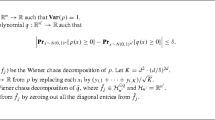We introduce a treatment of parametric estimation in which optimality of an estimator is measured in probability rather than in variance (the measure for which the strongest general results are known in statistics). Our motivation is that the quality of an approximation algorithm is measured by the probability that it fails to approximate the desired quantity within a set tolerance. We concentrate on the Gaussian distribution and show that the sample mean is the unique “best” estimator, in probability, for the mean of a Gaussian distribution. We also extend this method to general penalty functions and to multidimensional spherically symmetric Gaussians.
The algorithmic significance of studying the Gaussian distribution is established by showing that determining the average matching size in a graph is #P-hard, and moreover approximating it reduces to estimating the mean of a random variable that (under some mild conditions) has a distribution closely approximating a Gaussian. This random variable is (essentially) polynomial time samplable, thereby yielding an FPRAS for the problem.
Similar content being viewed by others
Author information
Authors and Affiliations
Corresponding author
Rights and permissions
About this article
Cite this article
Schulman, L.J., Vazirani, V.V. A Computationally Motivated Definition Of Parametric Estimation And Its Applications To The Gaussian Distribution. Combinatorica 25, 465–486 (2005). https://doi.org/10.1007/s00493-005-0028-4
Received:
Issue Date:
DOI: https://doi.org/10.1007/s00493-005-0028-4




